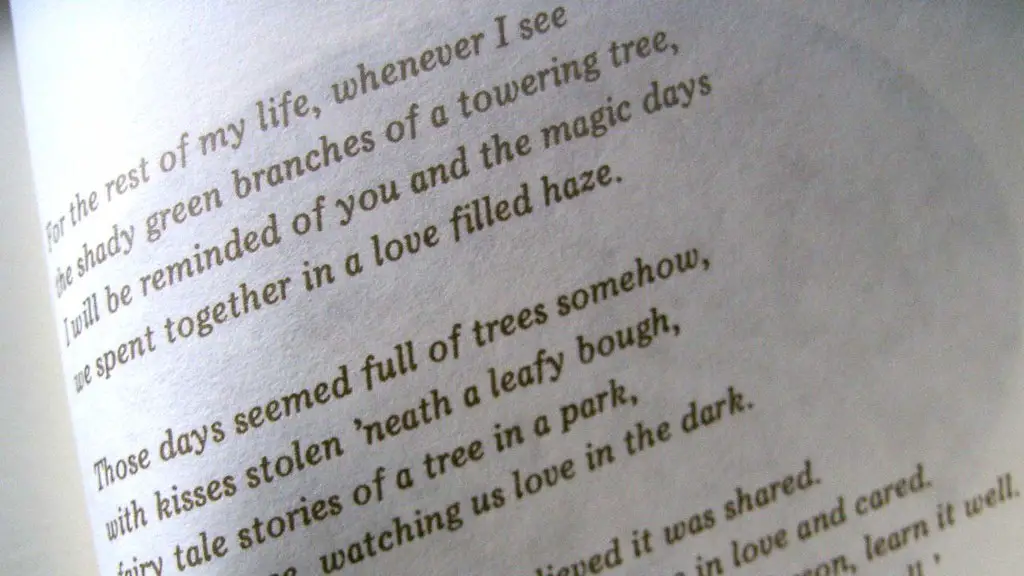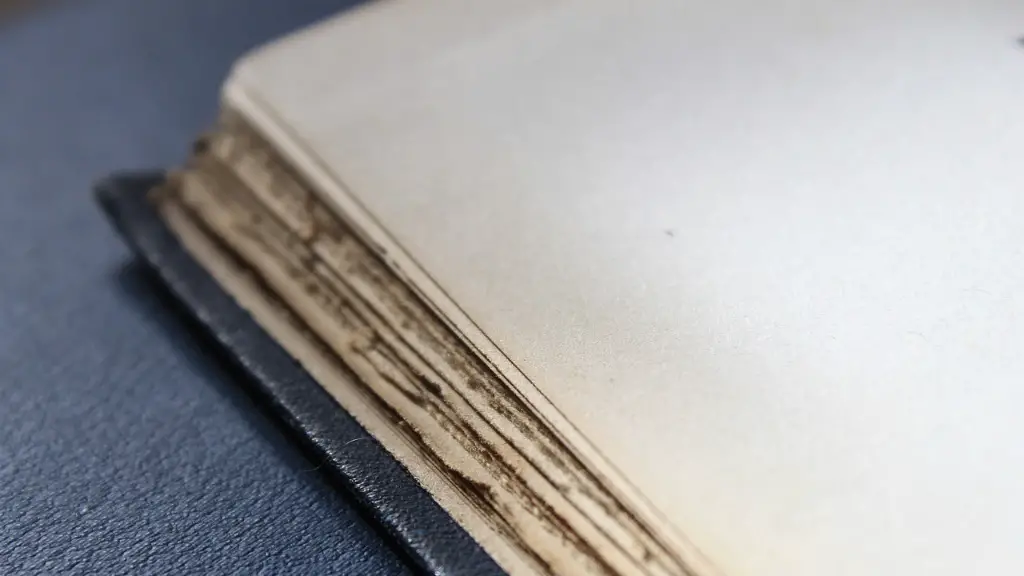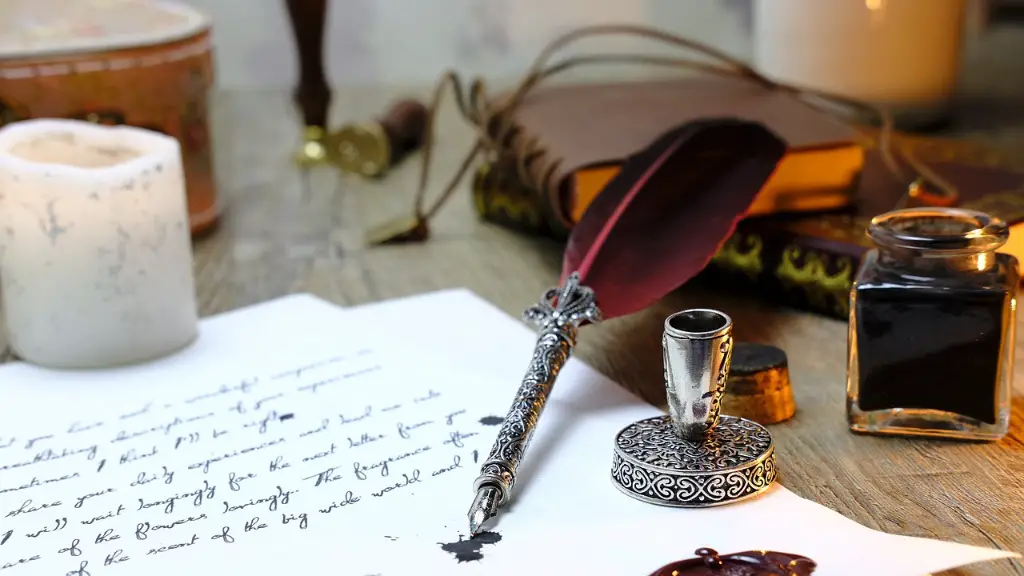Epic poetry has been an integral part of human culture since ancient times. It is an art form that uses a combination of language and imagery to tell a story and evoke emotion. Epic poetry is characterized by themes of heroism, valor, and larger-than-life battles. It also typically covers traditional topics such as the fate of kings and their ruling dynasties. Epic poetry is one of the oldest literary forms, used by early storytellers to transmit elements of culture from one generation to the next.
Epic poetry typically features a journey or quest of some kind, often involving a hero and his or her struggles and trials along the way. This hero may begin their journey as an ordinary person, but through the events and challenges of their quest, they become increasingly heroic in stature. Epic poetry is known for its expansive settings, which can often span entire continents or even worlds. It also typically has long passages and lines of verse, written in a more formal and elevated style of language. Often, the content of an epic poem can be made up of many stories, with the hero at the centre of them all.
A key attribute of epic poetry is its strong use of imagery. This can be both visual, through descriptions of places and people, and symbolic, through references to gods or other divine elements. Many epics feature lyrical interludes, which can involve dialogue between the characters or an inner monologue of the narrator. Archetypal themes are prevalent throughout the genre, from titans and gods to the human struggle against fate and death. Epic poems are typically composed in a style known as ‘high diction’, consisting of formal language, poetic devices such as alliteration and assonance, and often events and settings that are symbolic of larger issues.
Themes of valor and heroism are especially common in epic poetry, with examples such as The Iliad and The Odyssey. These works emphasize the struggle of man against great odds, and often the journey of the hero not only affects those they encounter, but also the course of entire civilizations. Even in death, epic heroes often inspire the generations that follow through their self-sacrifice and noble deeds. Epic poetry also has a clear structure, which may include an introduction, a course of action, a decisive battle or confrontation, and a resolution.
Epic poetry has existed for thousands of years, with its structure and format often varying from culture to culture. Yet certain features of the genre remain unchanged. Epic poetry is intended to evoke strong emotion and provide a dramatic, expansive setting, and its use of symbolism and allegorical elements give it a timeless quality that still resonates with readers today.
Why is Epic Poetry an Important Element in Human Culture?
Epic poetry serves an important role in human culture, providing a narrative medium through which to both remember and pass down history and cultural values. Grand works such as The Iliad and Beowulf remain prominent and well known, even several centuries later. Epic poetry forms part of a larger cultural context, giving voice to the collective experience and memory of a people. It speaks to a shared set of beliefs and truths, providing an understanding and common ground across many generations.
Epic poetry can also be seen as a response to events and challenges of the past, repurposing history as a source of personal and collective meaning. By looking back to the heroic deeds of the past, we can consider and appreciate our own achievements, grit and determination in trying times. Epic poetry is also often used to advance a society’s values, such as courage, justice and honour. It serves to show what is admirable and what society should strive for, pushing readers to think thoughtfully and deal with difficult issues.
At the same time, epic poems can also provide moments of levity, humor and reflection. They often contain a mixture of fun stories and moments of lightness and balance out the drama and intensity associated with heroic endeavours. Many epic poems also contain embedded messages about morality and ethics, allowing readers to anticipate certain events and consider how the heroes of the story handle difficult situations. Through this, epic poetry can be used to explore how different cultures approach morality and evolve over time.
How Can Epic Poetry Help Us in the Modern Day?
Epic poetry can help us in the modern day to be inspired by the feats of our predecessors and to reflect, with optimism, on our own virtues and accomplishments. By focusing on the successes of those who have gone before us, we can develop a more positive perspective of our present world. Epic poetry can also be used as a tool to think more deeply about justice and morality, providing answers to difficult questions even in our own era.
Epic poetry can also be a way to explore the notion of heroism in culture, providing insight into its changing meanings. Concepts of traditional heroism can still be relevant today, yet they often need to be interpreted and contextualized in order to make sense in our current era. By considering great works of epic poetry as a source material, we can redefine what constitutes a hero and recognize those who display gallantry and courage in their daily lives.
Finally, epic poetry can spark an appreciation for the power of language and its ability to create an entire world with just words. It is a reminder of the importance of storytelling, of being able to share our stories with others and to echo the same message of courage, optimism, and resilience generations later. Through epic poetry, we can look back to the past to see how far we have come and to be reminded of our own immortal legacy.
What Elements Make Epic Poetry Unique?
Epic poetry is unique in its use of grand language and sweeping settings, often inspiring awe in the reader. It is a story of epic heroic journeys and grand tales, yet it is also intimate and personal, exploring more subtle aspects of the human condition such as loyalty, courage and honor. Epic poetry typically follows a specific structure, beginning with an introduction, providing a clear course of action and climax, and then concluding with a resolution.
Epic poetry also contains a vast array of characters, some of them superhuman, while others are entirely human in nature. The heroes of epic stories are often larger-than-life figures, performing miraculous feats and acting as symbols of moral courage and justice. It is through their hardships that the lessons of the story are explored, allowing us to contemplate the meaning of honor and courage in our own times.
Unlike other forms of literature, epic poetry does not tend to focus on characterization and dialogue in its narrative. instead, its power comes from its vivid description and imagery, often bordering on the symbolic or allegorical. What’s more, epic poetry is also typically written in high diction, consisting of a more ornate form of language that is rich in both form and substance. This allows the storyteller to create a text which both educates and engages the reader.
What is the Significance of Epic Poetry?
Epic poetry has acted as a form of mythology of cultures and societies around the world since ancient times. By telling stories of heroes, gods, and powerful empires, epic poetry has served to pass down the values and beliefs of a culture. It can also serve to provide a narrative of a civilization’s successes and failures, and show us how the present has been shaped by the past.
Epic poetry can also inspire us to be more courageous, compassionate and ambitious. Its grand themes and larger-than-life subjects can challenge readers to push their own boundaries and tackle difficult problems. In doing so, epic poetry can provide an inspiring vision of what is possible, even in dark or difficult times.
Finally, epic poetry serves as a reminder of the importance of storytelling and its role in human culture. By connecting us to the past, it can show us our place in the world and the legacy we will be leaving behind. Epic poetry is powerful in its ability to evoke emotion and remind us of the power of words and stories.
What Techniques are Used in Epic Poetry?
Epic poetry typically has a range of poetic and literary techniques to make it more compelling. These can include alliteration and assonance, which are the repetition of consonants and vowels, respectively. There is often an emphasis on the use of poetic language and extended metaphors to set the scene and evoke emotion. Epic poets also often employ a range of narrative devices such as direct address, similes and personification.
Epic poetry is also typically structured in a way which keeps the story moving and exciting, often with a formal beginning, middle and end. An important part of the form is its repetition, with key events being revisited and reflected upon to remind the audience of the unfolding story. There may also be moments of dialogue, which can add tension and build the drama between characters.
Finally, epic poetry often relies heavily on symbolic elements, such as gods, monsters and other creatures, to create a larger story. These devices are used to evoke an atmosphere of grandeur, with the larger themes and goals of the story influencing each action of the heroes. This allows for a complete experience for the reader, combining narrative and emotion with insight, wisdom and an understanding of human nature.
What are the Challenges of Writing Epic Poetry?
Writing epic poetry can be very challenging, as it is often a labor of love that requires dedication and commitment to the craft. It requires a certain level of creative energy and ambition to be successful at epic poetry, as the genre is received best when it is full of grandeur and emotion. Writers must also have a strong understanding of the form and structure of the genre, in order to ensure that the thematic elements of the story are effectively communicated.
Epic poetry also involves a great deal of research and preparation, as a solid knowledge of history, mythology and symbols is necessary. Additionally, the language of epic poetry must be carefully crafted to create a more lyrical and formal style. This can make the writing process more time consuming, as writers must carefully consider their use of metaphors and poetic devices, as well as create engaging characters and settings.
Finally, epic poetry has a certain reputation as a very serious form of literature, so writers may feel pressure to make their work fit the expectations of the genre. This can make it increasingly difficult to find ways to keep the piece fresh and to avoid common topics and themes. Writers must therefore take risks, combining their own unique voice and perspective with the conventions of the genre in order to create something or unique, stimulating and inspiring.





